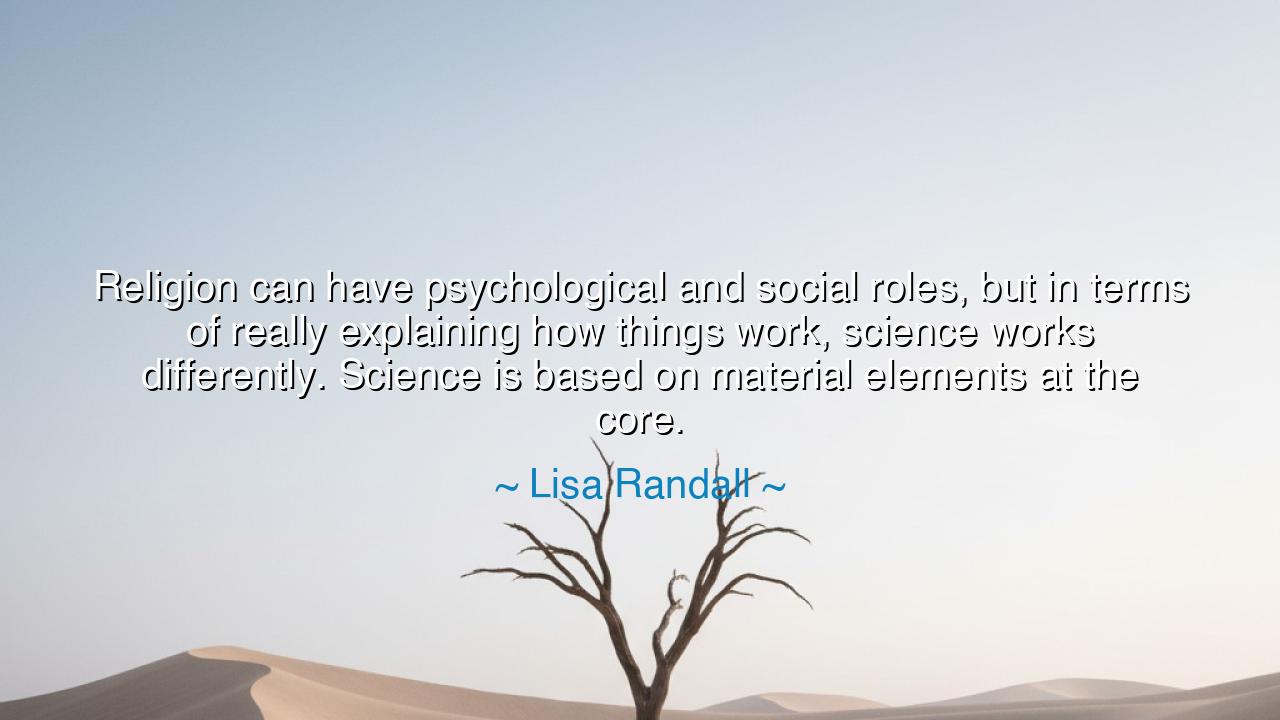
Religion can have psychological and social roles, but in terms of
Religion can have psychological and social roles, but in terms of really explaining how things work, science works differently. Science is based on material elements at the core.






Lisa Randall, seeker of the cosmos and interpreter of hidden dimensions, declared: “Religion can have psychological and social roles, but in terms of really explaining how things work, science works differently. Science is based on material elements at the core.” In this statement, she reveals the two great pathways by which humanity has sought to understand existence: the path of religion, which gives comfort, community, and meaning, and the path of science, which unravels the workings of matter and energy with precision and evidence. Both touch the human spirit, yet they move in different realms.
The ancients themselves knew this duality. They looked to religion for answers to the great questions of purpose, morality, and destiny, and to observation for the movements of the stars, the rhythms of the seasons, the ways of plants and animals. When the Babylonians charted the heavens, or when the Egyptians measured the Nile, they were practicing science. When they raised temples to their gods, they were practicing religion. Randall’s words remind us that though both may coexist, they are not the same. Science seeks the how, while religion often seeks the why.
History offers us vivid examples. Consider Galileo Galilei, who gazed through his telescope and saw moons orbiting Jupiter, challenging the ancient belief that all revolved around Earth. The church, representing the religion of his day, resisted him, for his discoveries unsettled their worldview. Yet Galileo persisted, knowing that science, rooted in observation and material elements, revealed how the universe truly worked. In his struggle, we see Randall’s distinction: religion may guide hearts and societies, but science explains the machinery of nature.
And yet, Randall does not scorn religion. She acknowledges its psychological and social roles: it binds communities, offers comfort in suffering, and gives symbolic language to the mysteries of existence. A people without such roles risk fragmentation. Religion answers the cries of the heart—“Why am I here? How shall I live? What happens when I die?” But when it comes to the mechanisms of atoms, the dance of galaxies, the code of DNA—there, science works differently, grounding itself in what can be tested, measured, and seen.
This distinction is not conflict but clarity. To expect religion to replace science is to misuse it, just as to expect science to provide ultimate meaning is to misunderstand its scope. Randall reminds us that the greatness of science lies in its discipline: its refusal to claim certainty without evidence, its devotion to the material, its power to reveal hidden truths of nature. The greatness of religion, by contrast, lies in its power to shape hearts and societies, to provide narratives of belonging and hope.
The lesson, then, is balance and humility. Honor religion for what it gives: community, moral vision, symbolic depth. But honor science for what it reveals: the structure of the universe, the workings of the body, the nature of matter itself. Do not confuse their realms, and do not pit them as enemies. For history shows that when they are properly understood, they can coexist, each guiding humanity in its own way.
Practical actions follow. Seek knowledge in science without fear, for truth is not the enemy of meaning. Let your curiosity be boundless, and respect the discipline of evidence. At the same time, if you draw strength from religion, let it shape your compassion, your humility, and your reverence for life. Build bridges between the two, understanding that together they enrich the human journey—one explaining how the stars burn, the other teaching why we might look to them with awe.
O seeker, remember Lisa Randall’s wisdom: religion gives roles, but science gives explanations. Religion binds society, but science reveals the universe. Walk with both in their proper places—let your heart be lifted by faith, and your mind be sharpened by inquiry. For in doing so, you walk in the fullness of humanity: grounded in matter, yet open to transcendence.






AAdministratorAdministrator
Welcome, honored guests. Please leave a comment, we will respond soon